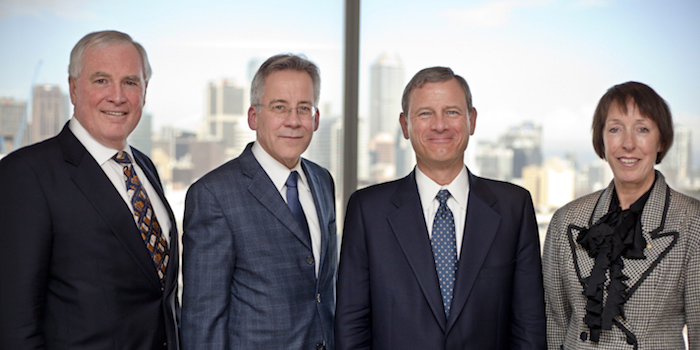The significance of the relationship between Australian and American Jurisprudence was evident in July this Year during the historic visit to Melbourne Law School by the Chief Justice of the United States.

The Honourable John G. Roberts, Jr, has led the Supreme Court of the United States of America since 2005, when he was nominated for the seat by President George W. Bush. He came to Melbourne Law School between the 19th and 23rd of July 2010 to teach a five-day intensive workshop on the history of the Supreme Court. Participating members of the Melbourne legal community learned a great deal from his presentation, and from each other.
Chief Justice Roberts' workshop, the United States Supreme Court in Historical Perspective, encompassed the major events, disputes and personalities that have shaped the Court over the past 200 years. Drawing on 400 pages of pre-reading, we considered contrasting perceptions of the judicial function in constitutional "moments" such as the foundational constitutional opinion in Marbury v. Madison (1803), the slavery case of Dred Scott (1857) and the New Deal dissents of the 1930s. Chief Justice Roberts was joined at the lectern by Mr Jeffrey P. Minear, Counselor to the Chief Justice, himself a distinguished Supreme Court litigator. (Originally, Professor Richard J. Lazarus was to have co-taught with the Chief Justice, but had to withdraw after his appointment by President Obama to lead a President's Commission into the Gulf of Mexico Oil Spill.) The interpretation and analysis of the material by Chief Justice Roberts and Mr Minear were engaging and revealing.
The format of the workshop gave us ample opportunities to learn from one another, as well as from the top judicial officer of the United States.
At the initiative of the Dean, judges, students (who excelled in answering questions posed to them by the two lecturers), Solicitors-General, academics and barristers sat together. Interventions from participants, such as the Honourable Kenneth Hayne AC, Justice of the High Court of Australia (who also gave the vote of thanks on the final day), guaranteed valuable Australian perspectives and comparisons. The different ways of reading constitutional and historical material made us reflect anew on the Australian legal order.
This sense of history was inescapable given who had come and what was taught. This sense was skilfully developed by Chief Justice Roberts himself. He was keenly interested in hearing about Australian law and practice. He welcomed discussion, and seemed to relish questioning the select JD, LLB and PhD students lucky enough to attend. He offered sometimes frank views on institutional and procedural reform – such as, for example, his clear preference for a more specialised bar before the Supreme Court, and more uniform opinions from the bench. He favoured what he thought of as a minimalist, non-purposive interpretation of the Court's jurisdiction, and saw no need to enlarge standing rules or the scope for amicus briefs.
Chief Justice Roberts' views sparked a variety of responses – especially in light of the court's explosive decisions supporting the criminalisation of speech that is designed to discourage terrorist organisations from violent action (Holder, 2010), protecting the speech of large corporations seeking to influence the outcome of elections (Citizens United, 2010) and striking down legislation restricting the possession of firearms (Heller, 2008) – many of which decisions were canvassed in an August roundtable for members of the Melbourne Law School's Centre for Comparative Constitutional Studies on The US Supreme Court in Critical Perspective. Amongst the diversity of views about the Court, its opinions and its role, a unifying theme was strongly felt: namely, the enduring value of our countries' shared legal foundations and ongoing relations.
Image: Dean of Melbourne Law School, Professor Michael Crommelin AO; Counselor to the Chief Justice of the United States, Jeffrey P. Minear; Chief Justice of the United States, the Honourable John G. Roberts, Jr; and Chief Justice of Victoria, the Honourable Marilyn Warren AC.